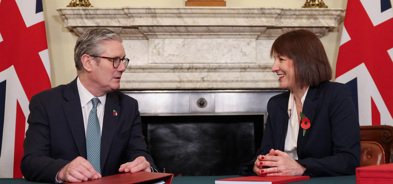The September Market Pulse
Tilney Group’s Chief Investment Officer Chris Godding discusses the macroeconomic ideas and research from September 2019.
The value of investments can fall as well as rise and that you may not get back the amount you originally invested.
Nothing in these briefings is intended to constitute advice or a recommendation and you should not take any investment decision based on their content.
Any opinions expressed may change or have already changed.
Written by Chris Godding
Published on 30 Sep 20196 minute read

The political environment continues to dominate in markets. The US/Sino trade negotiations continue to ebb and flow while in the UK we are still no closer to clarity on Brexit.
Even the debate on climate change at the UN has been drowned out in the news by the threat of the impeachment of Donald Trump, thus avoiding an uncomfortable admission that CO2 emissions per capita in the US are more than double the average for the rest of the world. Talk about fiddling while the world burns.
Corporate investment
The consequence of political uncertainty for corporate investment is indecision, and the negative impact in terms of earnings growth and economic activity is spreading. There is no evidence to date that any of the stimulus injected by the US Federal Reserve or the European Central Bank has had any effect and we expect it to be muted at best since the price of money is not the problem.
The US has been a stronghold of growth thanks to a buoyant domestic economy, but the latest data show a distinct loss of momentum in terms of manufacturing and new orders with 50 being the barrier between growth and contraction (see graph below). While a trade deal will help resolve this uncertainty, the spending will take time to restart and then feed through to the economy. Subsequently, if President Trump is banking on a strong economy going into the next election, he is running out of time to do a deal.
Fading momentum
Source: Bloomberg
The UK faces a similar situation with regard to investment thanks to Brexit. While the fear of a no-deal outcome has diminished, the lack of clarity gives corporate CFOs enough justification to sit on their hands and enough reason for foreign direct investment (FDI) to stay on the sidelines.
Decline in corporate earnings growth
One consequence of the global slowdown in investment is a decline in corporate earnings growth expectations which have fallen 6.5% on average from the start of the year. A strong US dollar and a slowdown in trade have hurt emerging market earnings the most so far (-13%) but the US numbers are also down nearly 5% as the fiscal dividend of 2018 fades.
UK earnings have held up reasonably well (-5.2%) despite Brexit, highlighting the global nature of profits in the UK. In the context of an US$84 trillion global economy, the relatively short-term implications of a no-deal Brexit (estimated at £45 billion or 0.05% of global GDP) is a relatively inconsequential rounding error for global investors.
Earnings revisions
Source: Bloomberg
Equities have been resilient
Despite the difficult political backdrop, equity markets have been remarkably resilient with the MSCI World All Country index returning just over 16% year to date in local currency terms. Declining bond yields are the driver of this unusual divergence with earnings as Central banks around the world cut interest rates in the face of slowing growth. ‘Don’t fight the Fed’ is the simplistic mantra to explain the gains and the higher valuations.
In the most basic form of the dividend discount model, the present value of future cash-flows of a company will rise if interest rates fall and vice-versa. For example, the present value of £10 in earnings per year over 10 years using an interest rate of 5% is £77.22 but this rises by 16% to £89.83 if we use 2% as the discount rate. Therefore, despite the fall in earnings expectations, the rise in markets is rational given the recent dramatic declines we have witnessed in interest rates. However, it does mean that equities have become more expensive in terms of price/earnings, and the assumption that earnings will not continue to deteriorate from here is far from assured.
P/E ratios have risen
Source: Bloomberg
The future of monetary and fiscal policy
With interest rates now closer to, or even below the ‘zero-bound’, the key question is how much longer we can rely on monetary policy to provide effective support. Policymakers are now more frequently referring to the ’reversal rate’ where the effects of low or negative interest rates become a net negative for the economy as a whole. This implies that we are pretty close to the grand finale for monetary policy. In his recently updated Long Term Asset Return Study, Jim Reid at Deutsche Bank suggests we are not a million miles away from helicopter money and the next step is where “governments can successfully and consistently issue the holy grail of funding – zero-coupon perpetual bonds”. He goes on to say that “governments have yet to fully embrace the spending power that this may offer them. It may take the next recession to encourage the move.”
If governments do start spending the ’free money’ that the Central banks have served up the implications for investment strategy over the next 10 years are quite profound. Fiscal spending channels money from the financial economy into the real economy via investment in infrastructure and expansion of government services or subsidies. While interest rates will have a natural tendency to rise in these conditions, the bond repurchases by the Central banks should be executed effectively enough to keep them below the growth rate of GDP and prevent the accumulation of even more debt. In other words, financial repression will continue as far as savers are concerned and equities will be one of the better ways to preserve the real value of wealth.
The ‘free money’ environment is a more powerful concept for those countries where the original financing was expensive compared to today’s rates. In Italy, for example, rolling over current BTPs (Italian government bonds) at a refinance rate of 1% (current 10-year rates are 0.83%) for the next five years would superficially ’save’ the Italian government the equivalent of 5% of GDP or around €100 billion. Potentially this could be spent productively on something other than interest cost. This €100 billion estimate also purposefully ignores a boost from the fiscal multiplier, which in Italy is estimated at 1.25x and I do this for two reasons – i) the multiplier is virtually impossible to predict and ii) the European Commission takes a bleaker view of the multiplier and is likely to push back against optimistic assumptions in terms of budget allowances. Nonetheless, the benefits of refinancing could be quite significant for the Italian economy, and any country rolling over more expensive short-term debt, over the next decade.
In the UK, the current Government’s fiscal plans suggest a positive fiscal impulse of about 0.4% of GDP per year to boost the economy. However, this is remarkably similar to the estimated 0.5% negative impact per year of a hard Brexit.
What this means for our investment strategy
While there is very little evidence of a tangible shift from monetary to fiscal stimulus, it would appear to be the only remaining option and we are reviewing our investment strategy accordingly. In the meantime, we have a little more cash than usual in portfolios, looking for a hint of clarity on the prospects for investment and opportunistic entry points. These opportunities may be in the form of the UK equity market (which still looks compelling value to us, but momentum is missing thanks to political uncertainty) or potentially emerging markets equity. The latter are cheap relative to the rest of the world but are likely to stay cheap for now given the strength of the US dollar and the lack of a trade deal.
For more information or if you have any questions, please get in touch by calling 020 7189 2400.
Get insights and events via email
Receive the latest updates straight to your inbox.
You may also like…

Market news
2024 Autumn Budget Overview: The key announcements from Chancellor Rachel Reeves


Market news



